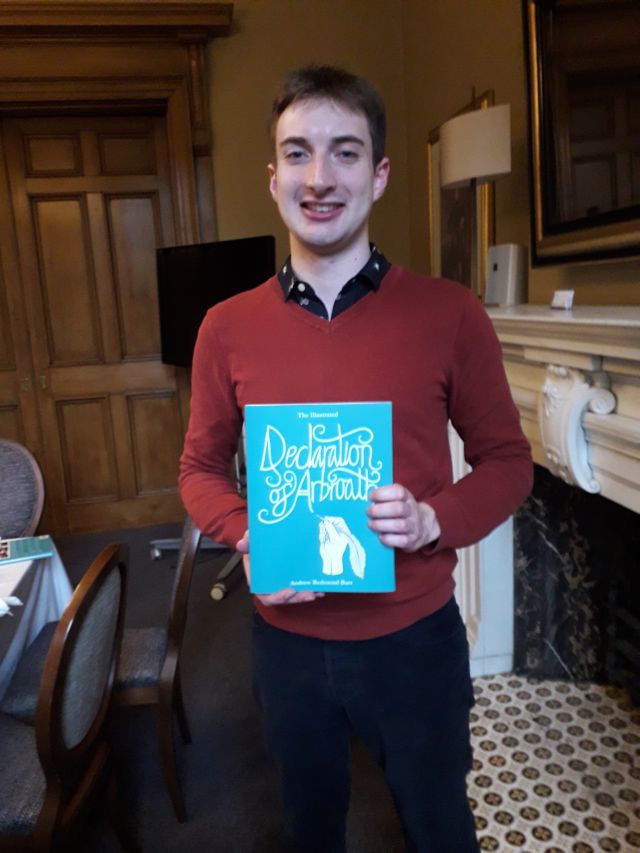ANDREW REDMOND BARR ON THE 700TH ANNIVERSARY OF THE DECLARATION OF ARBROATH
Andrew's new book anticipating next year's 700th anniversary is the first for some time to have been published by the Saltire Society, so he is very grateful for its support. Previous studies of the Declaration of Arbroath in 1320 have tended to be academic, so Andrew wanted to make the subject more accessible : but with the availability of only one illustration he had to read the document itself in order that images might come into his mind.

The Declaration was a diplomatic letter to Pope John XXII in Avignon at a time when ideas of Scottish identity were under threat. With the sudden death of Alexander III leaving no direct heir, King Edward I of England decided to take advantage of the power vacuum by invading the country to quash its very existence. In the act of a nation behaving as a community, the people responded to the hopes unleashed by Sir William Wallace by making Robert the Bruce their king not out of blind allegiance but as the conscious endorsement of a self-made leader who had stepped up to the task, and letters were sent to the ports of Lubeck and Hamburg indicating that Scotland was once again an independent nation and open for trade.
With victory at Bannockburn at 1314, the time had come to drop the sword and pick up the pen. The Church was literate and able to capture sentiments that might catch the Pope's attention. The ideals of people, power and liberty having been secured in war, John Barbour's Freedom is a Noble Thing signalled that a time had come to enjoy the smaller pleasures too, including the rights of the citizen. The nation was on the brink of transformation, full of stories about its past but looking forward to a clear identity in the wider world.
The Pope was in those days like a sort of United Nations, the highest diplomatic authority in Europe, so was inundated by letters pleading for special favours. Presenting Scotland as being under the protection of St Andrew and ruled in his name by Robert the Bruce, the Declaration starts off in a fawning manner, but ends up being blunt and direct in its life and death appeal for protection against the English. It was compiled at Arbroath because here was an Abbey well away from the frontier but by the sea, so that it could be couriered by ship to the Continent.
At the core of the Declaration are the words that for as long as a hundred of us remain alive, never will we on any conditions be subjected to the lordship of the English. It is in truth not for glory, nor riches, nor honours that we fight, but for freedom alone, which no honest man gives up but with life itself.
The commitment to Robert the Bruce was conditional on him continuing to do a good job in the name of the whole community, and the plea was for the Pope to urge the English king to call off the continuing threat of invasion. The response from the papal court was tentatively encouraging, Pope John himself writing to the English king quoting from the Declaration, telling him to halt the invasion and make peace with his northern neighbour.
The spirit of the Declaration has echoed down the ages, through Covenanting times and the stance taken against the Union of the Parliaments by Fletcher of Saltoun to the modern day. Celebration of the 600th anniversary in 1920 was against the background of victory in the recent Great War, so the emphasis was on the struggle to preserve freedom. In 1970 the 650th was set against a background of tension between the authorities and nationalists, with Wendy Wood shouting "hypocrite" at Secretary of State William Ross who relished his role as the Hammer of the Nats.
Anecdotes show how the Declaration's place in our official history continues to inspire but remains contested by both sides of the political divide. Offering a vision of a Scotland that is honest and sincere but bold in purpose, it speaks of a nation transformed by the power of words, of hope and a reminder of Scotland's place in the world but the importance of community and the origin of our democratic ideals.
Buy your copy here.